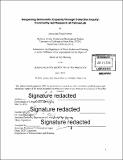Deepening democratic capacity through collective inquiry : community-led research at PalmasLab
Author(s)
Harvey, Jenna Ann Draud
DownloadFull printable version (15.15Mb)
Alternative title
Community-led research at PalmasLab
Other Contributors
Massachusetts Institute of Technology. Department of Urban Studies and Planning.
Advisor
Gabriella Carolini.
Terms of use
Metadata
Show full item recordAbstract
In 2015, research and innovation group PalmasLab developed their inaugural research project: a "wealth and poverty map" meant to provide a multi-dimensional picture of community development. PalmasLab is located in, and serves Conjunto Palmeiras, a neighborhood on the periphery of Fortaleza, Brazil that is often stigmatized as being poor, marginal and violent. The team at PalmasLab, made up primarily of young people from the community, seek to use research as a means to push back on these toxic narratives and as a tool for affecting change in the neighborhood. This thesis recounts the development of the research project, which transpired through a participatory action research (PAR) process between the MIT Community Innovators Lab (CoLab) and PalmasLab. Having engaged in observation, reflection and discussion as an active participant in the process, I describe how a research concept and survey methodology were created through a process of collective inquiry grounded in territorial lived experience. Subsequently, I recount how the PalmasLab team led a group of 35 local youth in the implementation of their survey in the community, a process that led to the articulation of trajectories for future action. Borrowing from Emirbayer and Mische's (1998) concept of projective agency, I argue that through the process, the PalmasLab team both exercised and strengthened their collective capacity to reflectively distance themselves from the constraints of the present in a way that enabled the development of future aspirational projects. Furthermore, drawing from the perspectives of John Dewey, Paulo Freire and Arjun Appadurai, I argue that projective agency should be understood as a democratic capacity that cannot be transferred from "capacity-builder" to "recipient," but rather that it is strengthened through collective social inquiry. Based on my experience in this process, I argue that PAR has the potential to contribute to a new culture of practice within fields such as international development and planning where "problem-definition" has historically been the purview of "experts."
Description
Thesis: M.C.P., Massachusetts Institute of Technology, Department of Urban Studies and Planning, 2016. Cataloged from PDF version of thesis. Includes bibliographical references (pages 111-116).
Date issued
2016Department
Massachusetts Institute of Technology. Department of Urban Studies and PlanningPublisher
Massachusetts Institute of Technology
Keywords
Urban Studies and Planning.